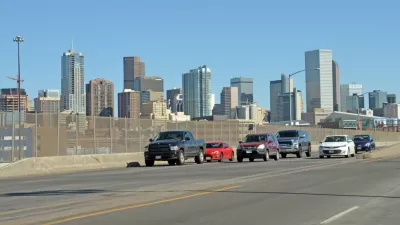The senate majority leader made clear that a mileage fee is not in the state's future. Diverting a half cent from the sales tax to the transportation budget took pressure off finding a sustainable solution to the state's transportation funding crisis
One thing appears clear in Connecticut when it comes to transportation funding: the Road Usage Charge is Not the Future of Road Funding.
"A proposal to charge state motorists by the amount of miles they drive on Connecticut roads has been rejected by Democratic leaders of the House and Senate," writes Ken Dixon for CT Post.
Senate Majority Leader Bob Duff indicated the road usage charge, the basis of the Oregon plan launched July 1 that transportation policymakers throughout the country have been eyeing, will not be part of "Gov. Dannel P. Malloy’s proposed $100 billion, 30-year plan to overhaul the state transportation and transit infrastructure."
In an August 7 statement, Duff said that in "addition to current sources of revenue from fuel taxes, there’s a new law dedicating 0.5 percent of the state’s 6.35 percent sales tax to transportation."
However, that sales tax is another example of a "diversion"—rather than increasing dedicated transportation funding like the gas tax, policy makers opt to divert existing revenue streams. Ironically, Mobilizing the Region asks, "Where's the lockbox?" to prevent diversion from the transportation budget.
Duff made clear his opposition to a mileage fee in his August 7 press release:
One of the ideas that recently garnered attention was the notion of a “mileage tax” that would be charged to residents based on the number of miles they drive in a certain period of time. This is an unproven idea. I am opposed to it and know that there is no appetite amongst Senate Democrats to advance this idea should a formal recommendation come from the governor’s panel.
Meanwhile, the a long-term solution to transportation funding remains elusive, reports Keith M. Phaneuf of The Connecticut Mirror, a nonprofit, nonpartisan news outlet.
The state's Transportation Finance Panel, "which includes transportation advocates from both sides of the aisle, is studying how numerous states finance transportation," writes Phaneuf. "That means research into many examples of tolling, fuel taxes, project-labor agreements, public-private partnerships and various other topics all-but certain to spark intense debate."
(Chairman Cameron Staples, a New Haven Democrat and former state representative) was referring to a verbal sparring match that developed over research into a “mileage tax” – a system being tested in Oregon that levies a charge against residents for each mile they drive.
Phaneuf writes that Huff's opposition to the mileage charge was a response from a Republican attack on the funding option, while House Speaker Brendan Sharkey's noted that no one was even proposing such a charge. Was Huff too quick to condemn the road usage charge before it had even been discussed?
Phaneuf references "a new report Tuesday from the New England Public Policy Center, a think-tank affiliated with the Federal Reserve Bank of Boston, (that) tackled the controversial subject of gasoline taxes."
From introduction: "This research compares existing gas taxes in the New England states and examines alternative tax structures that could improve fiscal sustainability."
Links to past Planetizen posts on Connecticut's fuel tax can be found below under "related." Interestingly, the state's diesel tax dropped 4.2 cents on July 1.
FULL STORY: Majority leaders oppose ‘mileage’ tolls

Alabama: Trump Terminates Settlements for Black Communities Harmed By Raw Sewage
Trump deemed the landmark civil rights agreement “illegal DEI and environmental justice policy.”

Study: Maui’s Plan to Convert Vacation Rentals to Long-Term Housing Could Cause Nearly $1 Billion Economic Loss
The plan would reduce visitor accommodation by 25% resulting in 1,900 jobs lost.

Why Should We Subsidize Public Transportation?
Many public transit agencies face financial stress due to rising costs, declining fare revenue, and declining subsidies. Transit advocates must provide a strong business case for increasing public transit funding.

Paris Bike Boom Leads to Steep Drop in Air Pollution
The French city’s air quality has improved dramatically in the past 20 years, coinciding with a growth in cycling.

Why Housing Costs More to Build in California Than in Texas
Hard costs like labor and materials combined with ‘soft’ costs such as permitting make building in the San Francisco Bay Area almost three times as costly as in Texas cities.

San Diego County Sees a Rise in Urban Coyotes
San Diego County experiences a rise in urban coyotes, as sightings become prevalent throughout its urban neighbourhoods and surrounding areas.
Urban Design for Planners 1: Software Tools
This six-course series explores essential urban design concepts using open source software and equips planners with the tools they need to participate fully in the urban design process.
Planning for Universal Design
Learn the tools for implementing Universal Design in planning regulations.
Smith Gee Studio
Alamo Area Metropolitan Planning Organization
City of Santa Clarita
Institute for Housing and Urban Development Studies (IHS)
City of Grandview
Harvard GSD Executive Education
Toledo-Lucas County Plan Commissions
Salt Lake City
NYU Wagner Graduate School of Public Service




























